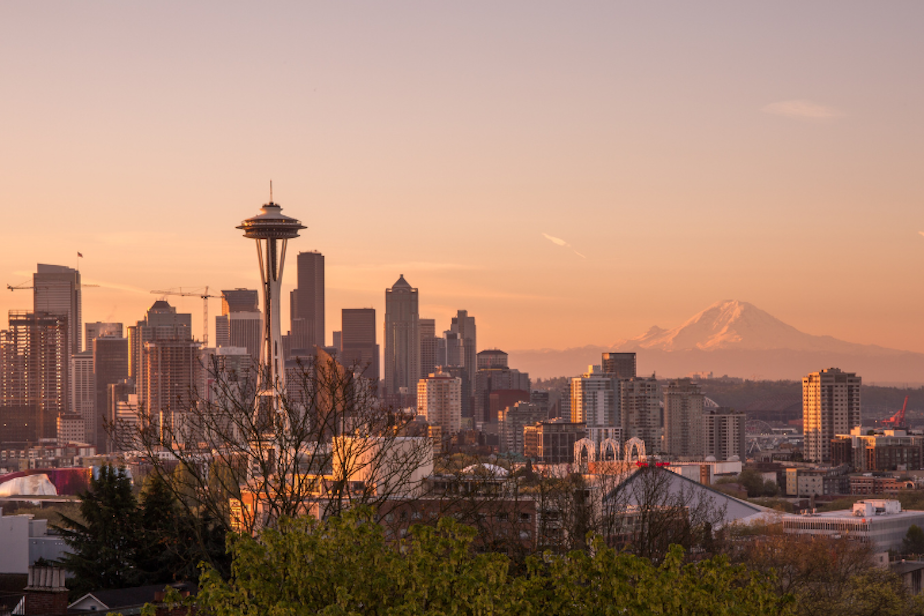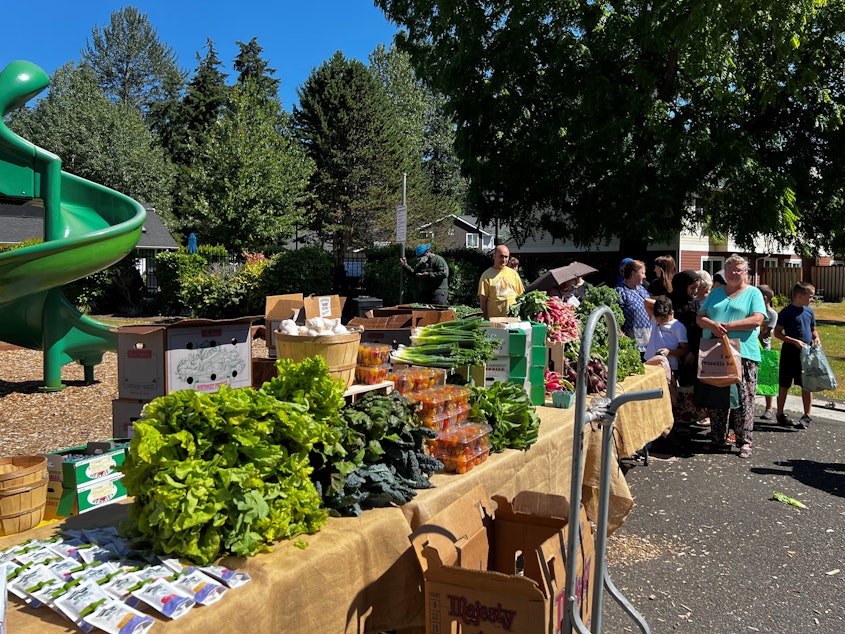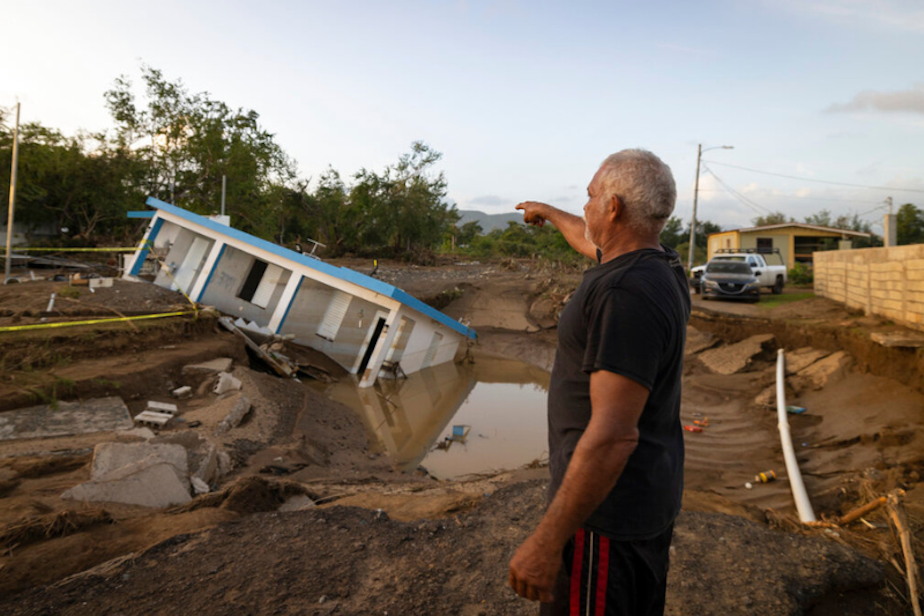Have you ever seen the rain, coming down on a Seattle summer day?: Today So Far

- The driest Seattle/Tacoma summer on record.
- The housing market in the Seattle area is cooling down. What does that mean?
- Monkeypox is infecting about 20 people each week in Washington state.
- King County's budget plans for law enforcement.
This post originally appeared in KUOW's Today So Far newsletter for September 22, 2022.
I recently watched Cosmo warily watching the sky outside our home. He was oddly avoiding going outside and had a general vibe of being weirded out. Watching this, my wife Nina paused for a moment before saying, "Has Cosmo ever seen rain?"
Cosmo is our puppy. He came to us from Texas this summer and is less than a year old. I thought, "Of course he's seen rain. This is the Northwest." Turns out, I'm probably wrong. Summer 2022 is the driest summer on record for the Seattle-Tacoma area. Most of the rain we got over the season came on Sept. 16, probably the day Cosmo was being weird(er than usual).
Cue that Blind Melon song.
The National Weather Service reports that we got about half an inch of rain over the summer. That places 2022 at the top of the list of driest summers. Second place goes to 2017 with .52 inches of rain. In 1998 and 1987, we got 1.28 inches and 1.33 inches, respectively. And rounding out the top five, summer 2000 got 1.36 inches.
Sponsored
I suppose we hogged all the rain through winter and our extended spring. (That's how science works, right?) Last winter was the wettest on record. That was the second La Niña we had in a row. While we can't exactly predict how a La Niña will influence the weather, you can generally guess it will be colder, and maybe a bit wetter. We are now looking at a third La Niña in a row this winter, which is pretty rare. Read more here.
The housing market in the Seattle area is cooling down, according to the latest report from Redfin.
It's not just "cooling" down, it's slowing super fast, faster than anywhere else in the USA. Which begs a question: What does "cooling" mean? As Redfin puts it, it's about "measures of homebuyer demand and competition." Roughly 34% fewer homes sold within two weeks in August, compared to the same time last year, and they sold for 5% more per square foot (less than previous square-foot price spikes). Redfin also states that "home prices are falling from their peak, with the typical home selling for 2% less in August than a month earlier."
So, considering all that, the housing market is cooling. Many cities around the country are basically getting some Tiger Balm for the aches and pains of the housing market. The Seattle area is wrapping its market in ice packs and keeping it elevated. Of course, many folks have been priced out of the housing market altogether, so they're ... in an ice bath ... I think I stretched this metaphor too far. Read more here.
Side note: If your home happens to be in the city of Seattle, your electric bill is about to go up.
Sponsored
On the heels of Seattle's big police announcement, King County Executive Dow Constantine has provided a peek into his plans for public safety and behavioral health. The executive has yet to formally submit his two-year budget, but when he does (probably next week), it will include law enforcement investments such as hiring more deputies and buying body cameras for the King County Sheriff's Office. Also, spending $21 million to support transit security officers at transit centers and bus stops. Read more here.
Remember monkeypox? There haven't been too many headlines about it lately, but the virus, aka MPV, continues to spread in Washington state. KUOW's Paige Browning reports that about 20 people are being infected with MPV each week.
Thanks to a new MPV dashboard via the state's Department of Health, we can get a broad picture of the virus in Washington. So far, it's mostly infected men (97% of cases) ages 25-34. The vast majority of cases have been in King County (444 cases out of the state's total of 556 have been in King County). Read more here.
AS SEEN ON KUOW

Sponsored
Walnut Park residents gather as the FareStart mobile market is set up on September 16, 2022. For the past seven months on Friday afternoons, residents of Kent’s Walnut Park neighborhood have been able to pick up fresh produce and dry goods from an outdoor market. And it’s all free. The Walnut Park market is one of four free mobile markets in South King County run by the nonprofit FareStart. (Marian Mohamed / KUOW RadioActive)
DID YOU KNOW?
It's fall! Well, almost. If you're reading this newsletter after 6:04 p.m. Seattle time, then it's fall. If you're reading before then, you still have a few hours of summer left.
We say "fall" to note the season. But we can also say "autumn." It is called the autumnal equinox after all. This is my favorite factoid about the season and why Americans call it "fall." In short, autumn was the official name for the season in English-speaking regions starting in about 1300. It has Latin origins. Poets and artists began to spread the slang term of "fall" for the season in reference to the beautiful fall of the leaves that happens during this time. The two terms existed side-by-side for a while. But when America started to go its own way, American English became a thing and we opted for fall in prideful defiance of those tea-drinking, red-coated lobster scoundrels.
This concept of leaves falling to mark the time of year is not exclusive to English-speaking regions. In Thailand, for example, the term for autumn is "reu-doo-bai mai ruang," which roughly translates to season of falling leaves.
Sponsored
Before autumn and fall were popular, a lot of folks simply referred to this time as the "harvest season," because of all the harvesting that happened. That's why we have a harvest moon tonight — a concept that existed before Neil Young's 1992 album. It's the full moon closest to the equinox.
And one final point, I referred to this as the autumnal equinox above, and not a solstice. For example, we have a spring and autumn equinox, and a summer and winter solstice. Solstices happen when the Earth is tilted the maximum toward or away from the sun; equinoxes happen when the planet is not really tilting much toward or away from the sun.
ALSO ON OUR MINDS

Sponsored
Government officials in Puerto Rico have been working with religious groups, nonprofits and others braving landslides, thick mud and broken asphalt by foot to provide food, water and medicine for people in need, but they are under pressure to clear a path so vehicles can enter isolated areas soon.

